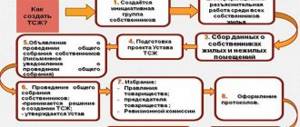70% of Russians want to improve their living conditions. But, unfortunately, not all citizens have enough money to buy a new home. Then the dilemma arises: which organization to contact? Housing cooperative or mortgage: pros and cons of both options. Mortgage housing is not available to everyone. Need money for a down payment. An alternative is housing savings cooperatives. This option is used if there are no large savings. Both methods of purchasing an apartment are different from each other.
How to buy an apartment through a housing cooperative?
First you need to become a member of this voluntary structure. Collective activity has one focus - obtaining housing. The organization has a charter. It reflects all contractual aspects.
Attention!!! To join housing cooperatives in Russia, you must be 16 years old.
You can obtain ownership of the living space only after paying off the dues. The activities of the cooperative are prescribed in the Housing Code (Chapter 11). Community members may redevelop, purchase, and maintain a multifamily property. This is where the formula comes from. At least 5 citizens can participate in the project. The maximum composition of the association should not exceed the number of apartments in a residential building. A certain category of citizens has the primary right to enroll in a cooperative:
- low-income groups of the population;
- persons recognized as needing housing.
How to join a cooperative?
- You submit an application, which is reviewed within a month;
- pay the entrance fee;
- a protocol is drawn up indicating the procedure for making voluntary contributions.
Recommended article: Loan for a down payment on a mortgage
Rules for registering apartment ownership
- The right is registered in the register;
- a document is submitted indicating that you have paid all fees;
- the list of documents to be submitted includes the charter;
- the final information is reflected in the protocol.
Housing cooperative or mortgage?
Let's assess the risks of participating in the cooperative program:
- Responsibility for the house, reconstruction and maintenance falls on the shoulders of the association. For example, an incorrect calculation may lead to the fact that the share contributions will not be enough to construct the facility. The result is that additional funds will be required, which means membership fees.
- Late payment of contributions. Accordingly, the construction period will be delayed. A dubious alternative to a mortgage. This will also affect the situation with contractors. These are additional expenses.
- Mass exit of participants from the cooperative. The organizers will have to return the funds. And this reduces the financial opportunity for further construction. Housing will have to wait a long time until the cooperative is replenished with new faces.
A housing cooperative is an alternative to a mortgage; you use the housing by paying contributions.
Buying an apartment through a housing cooperative or mortgage.
Let's compare the pros and cons.
- The annual percentage is lower in a cooperative. If we take average data, then from 1 to 4%. At the bank the rate is at 11 - 13% per annum.
- A mortgage loan includes a large list of documentation. You must provide certificates of salary and family composition. You must have registration in the city, guarantors, papers for other real estate. At the cooperative you show your passport and employment ID.
- The contribution to the cooperative is calculated at 3 - 6%. But in addition to this, you pay a share (2 - 3% of the loan amount) and a membership fee. In the case of a mortgage, a one-time payment is made - 20 - 30% of the cost of housing. The frequency of payments is set by the bank. In the cooperative, the issue is discussed at a meeting of the Housing Committee.
- The buyer cannot move into the property without paying 50% of the cost of the apartment. In the case of a mortgage, this can be done immediately after the transaction is completed. The apartment immediately becomes property. In a co-op you will have to wait until you pay the full price.
- Payment in both cases is made by monthly contributions to the credit institution.
Conclusion: Citizens go to cooperatives for low interest rates and convenient lending programs. You agree on the contribution amount and repayment schedule based on your capabilities. In this option, the initial payment is lower and there is no huge portfolio of documents. The first installment, by the way, can also be paid with maternity capital, using subsidies.
How housing cooperative works
Housing cooperative is a management company, which is, in essence, an organizer, inviting hired workers to carry out what is planned.
We can conclude that the members of the board of housing cooperatives, headed by the manager (chairman), perform managerial and coordinating activities. Basically, all the most important decisions that determine the action plan of the housing cooperative are made at the general meeting. An initiative group of people sets a specific date for a joint meeting, at which the main nuances and details of construction, as well as management, will be discussed.
The meeting is held under the strict supervision of the secretary.
Read about how to properly take minutes of a housing cooperative meeting here.
The founders send funds to a specially created account, from which construction is carried out, as well as the maintenance of the building and the surrounding area.
The founders of the housing cooperative have the right to control expenses and can review the reports at any time. Also, members of the meeting have the opportunity to independently set meeting dates, vote, and make some of their own amendments to the activities of the organization. This way you can avoid risks with housing cooperatives.
After the construction procedure is completed, the housing cooperative is transformed from a construction company into a management company. It is authorized to maintain residential premises, as well as other buildings and territory in proper condition and form, while taking into account the opinion of all founders.
The owners are now transferring funds to the same bank account of the founders, which are intended to pay off utility bills. Such cooperation allows owners to forget about the procedure for electing a management company upon delivery of the building to the owners.
Now you know for sure what housing cooperatives are and how they work.
Differences from HOA
A housing construction cooperative - these are the words behind the decoding of housing cooperatives - is created before the construction of a house begins; the members of the cooperative, through joint efforts and contributions, build a multi-apartment residential building. A homeowners' association jointly manages an existing home.
Participants
in housing cooperatives always buy back shares, which is why they are called shareholders.
The procedure for joining an HOA is determined by its charter. It may not require entry fees.
Members of the HOA are not required to cover losses arising as a result of its activities. Shareholders are liable for debts with the property of the housing cooperative and their own in the amount of the unpaid portion of the share.
The housing cooperative will be the owner of the residential premises until the participant pays the share in full. The HOA is not the owner of the apartment building.
An HOA can be created by the owners of several apartment buildings. The housing cooperative operates for the construction of one house.
Citizens who have reached the age of 16, as well as any legal entities upon making a contribution, have the right to join the Housing and Construction Cooperative. Only property owners can join the Real Estate Owners Association.
Income received from the activities of the HOA is spent on the common goals of its members - repair of entrances, local area. Housing cooperative distributes income among its participants.
What types of housing cooperatives exist?
There are several types of organizations that belong to housing construction cooperatives.
In practice, there are only two, the most common of them.
The first is a housing-construction cooperative, and the second is a housing-savings cooperative.
If you could read the information about the housing and construction cooperative in the paragraphs above, then you are probably not yet familiar with the latter.
This term has the abbreviation ZhNK, and is an organization formed by citizens that is non-profit in nature, exactly like the housing cooperative.
This organization tries to ensure the contributions they pay at the expense of all its members and founders.
These organizations operate on the basis of their charter. A layer of money is formed that the founders can spend on purchasing housing. All actions of the organization are regulated by the adopted charter.
The main difference between these organizations is that with a housing construction cooperative, housing is built, and with a savings cooperative, the amount for purchase is formed. In the future, after the housing issue has been resolved, the reorganization continues to operate within the framework of the management company.
What do reviews say about housing savings cooperatives?
Opinions differ, since buyers entering into agreements for participation in shared construction of housing under Federal Law - 214-FZ have priority with regard to lawsuits. Even if you terminate the deal and appeal to a higher authority, it is not a fact that you will get your money back. Because they are not in the cooperative fund. The law on the protection of consumer rights does not apply if objects are built by a housing savings cooperative in accordance with 215-FZ. The agreement with the cooperative does not appear in the Russian State Register, that is, it is not registered in Rosreestr, therefore, fraud and double sales occur. People complain about the small selection of apartments, and that at the end of construction there are unsightly options left.
Loan terms
Mortgage payments can take many years, especially if the borrower has limited funds to make monthly payments. Most mortgages have terms ranging from 15 to 25 years. And if the financial situation in the country changes, banks may change the cost of servicing both the loan itself and its terms. But it will be possible to move into the apartment in a couple of months.
In the case of residential complexes, the shareholder will not receive the apartment immediately, but only after his turn comes, which is now only 6 months. But the cost of the apartment will be fixed, and the shareholder’s payments will not change. And, if the shareholder pays off the cooperative not in 10 years, but faster, then his total overpayment will decrease, and he will have the opportunity to purchase a second apartment through the residential complex on preferential terms - the entrance and membership fees will be half as much.
“The cooperative does not attract money from outside. He only has the money of his shareholders at his disposal, so a queue of shareholders naturally arises. As soon as the amount necessary to purchase one apartment accumulates in the cooperative’s account, it is immediately purchased for the shareholder. Due to the fact that large sums of money are not stored in the residential complex account (only the funds necessary to purchase the next property), inflation does not affect these savings. When I became a shareholder in 2015, I had to wait a year and a half for my turn. Now there are many more shareholders, and accordingly, apartments are purchased much faster. The average waiting period has decreased to 6 months,” says Ilya Kudryashov.
A short list of cons
- If you contribute 50%, you need to wait several years. This is stated in the contract. Having taken out a mortgage loan, you immediately move into a new apartment;
- late contributions are punishable by fines and the risk of exclusion from the structure;
- annual fees are not refunded if the housing cooperative is liquidated or you leave it yourself;
- continuing the point above... the cooperative may go bankrupt;
- contracts do not have state registration;
- if you leave the cooperative early, pay a penalty;
- the living space belongs to the housing cooperative until the last installment is paid off;
- defending rights in court is problematic.
We hope that in the article you found answers to all your questions about housing cooperatives in Russia. Are they an alternative to a mortgage or not?
Rate the author
(
1 ratings, average: 5.00 out of 5)
Share on social networks
Author:
Maria Yurievna Sokhan
Date of publicationDecember 21, 2018February 25, 2019
An initial fee
If you take out a mortgage, the down payment is most often 10-20% of the total cost of the property. The residential complex offers several options.
A housing cooperative is a kind of “common pot” into which shareholders invest their funds. This money is used to purchase housing for the cooperative members. To purchase an apartment through a residential complex, you must have your own funds of 35% of the cost of the apartment - this is the minimum down payment. The cooperative will add the missing 65% for the shareholder from its mutual fund and purchase an apartment for him.
“For those who do not have the entire amount of the down payment at once, this amount can be formed over time by accumulating money in your share account in the cooperative, but the monthly share contribution must be at least 10 thousand rubles. When the down payment is formed and the turn to purchase an apartment comes up, the residential complex will purchase an apartment for the shareholder, which he himself will choose. And for 10 years, the shareholder will return the funds provided to him monthly to the cooperative without interest.”











